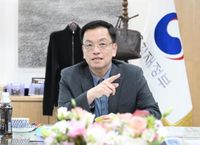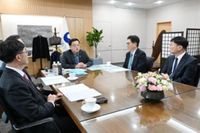On March 26, 2025, Deputy Prime Minister Choi Sang-mok convened a crucial meeting with the heads of four external agencies at the Government Complex in Sejong. The gathering included National Tax Service Commissioner Kang Min-soo, Customs Commissioner Ko Kwang-hyo, Public Procurement Service Commissioner Lim Ki-geun, and Statistics Korea Vice Chairman Ahn Hyung-joon. The primary focus of this meeting was to address pressing economic concerns, particularly in the wake of recent forest fires and the increasing complexities of global trade.
During the meeting, Choi emphasized the urgent need for strict measures against real estate tax evasion, particularly in areas experiencing market overheating. He directed the National Tax Service to respond decisively to issues such as illegal gifts, inflated contracts, and other forms of tax evasion that have become prevalent in certain industries.
Choi stated, "Respond strictly to real estate tax evasion, such as market overheating areas, illegal gifts, inflated contracts, etc." This directive underscores the government's commitment to maintaining fiscal integrity and addressing economic disparities exacerbated by recent disasters.
In addition to tackling tax evasion, Choi highlighted the importance of providing seamless tax support to small business owners affected by the recent forest fires. The government aims to ensure that these businesses receive the necessary assistance to recover and thrive in a challenging economic environment. He reiterated this point, emphasizing that the tax system must not impose additional burdens on the public, particularly the younger generation.
Choi also noted that certain sectors, particularly those involved in marriage, childbirth, and education, have been exploiting loopholes to evade taxes through disguised cash transactions. He urged the National Tax Service to take action against these practices, stating, "Correct the practices of some in the marriage, childbirth, and education industries who evade taxes through disguised cash transactions." This call to action reflects the government's broader strategy to promote fairness and accountability in the tax system.
On the international front, Choi expressed concerns about the increasing uncertainty in global trade, particularly in light of evolving tariff policies from the United States. He directed the Customs Service to actively support export companies in navigating these challenges, particularly with respect to product classification and country of origin certification.
Choi stressed the importance of blocking illegal drugs and harmful goods at customs clearance stages, especially given the recent surge in such items. He instructed the Customs Service to enhance its efforts in this area to protect public safety and maintain the integrity of the supply chain.
Furthermore, the Deputy Prime Minister addressed the role of the Public Procurement Service in fostering a supportive environment for small and innovative businesses. He called for comprehensive measures to eradicate tax evasion among high-income earners, leveraging advanced technologies such as artificial intelligence and big data to enhance transparency.
Choi remarked, "Focus on comprehensive measures to eradicate tax evasion by high-income earners through AI and big data, and help create an ecosystem for small, venture, and innovative businesses." This statement highlights the government’s commitment to leveraging technology to drive economic growth and innovation.
Statistics Korea was also tasked with preparing for the upcoming Population and Housing Census, which is conducted every five years. Choi requested that the agency ensure thorough preparation for this critical undertaking, as well as the development of new statistics to address challenges such as aging and population decline.
He stated, "Prepare thoroughly for the Population and Housing Census and the Agriculture, Forestry and Fisheries Census to be conducted this year, and continuously develop new statistics in response to various changes such as aging and population decline." This emphasis on accurate data collection is essential for informed policymaking and effective resource allocation.
Choi concluded the meeting by underscoring the importance of collaboration between the Ministry of Economy and Finance and the four external agencies. He noted that effective communication and teamwork are vital for implementing policies that resonate with the public and bring about meaningful change.
He said, "To bring about changes that the public can feel, cooperation between the Ministry of Economy and Finance and the four external agencies is crucial." This collaborative approach is intended to ensure that government initiatives are responsive to the needs of citizens and contribute to a more robust economy.
As the government navigates these complex challenges, the focus remains on fostering an environment conducive to economic recovery, innovation, and fairness. By addressing tax evasion, supporting small businesses, and enhancing data collection efforts, the administration aims to create a sustainable economic landscape that benefits all citizens.





